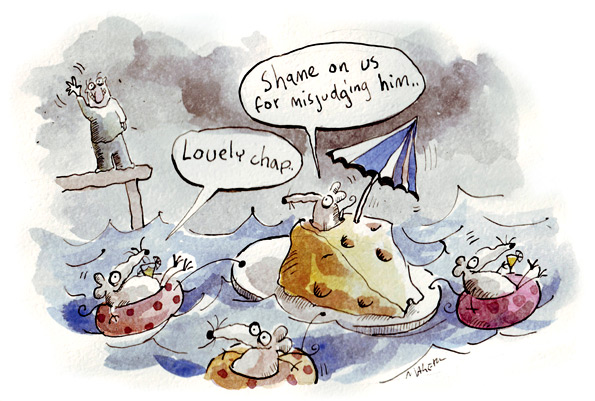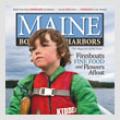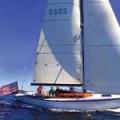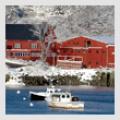View from the Porch - Issue 108
Issue 108
By Peter Bass
 Illustration by Caroline Magerl.
Illustration by Caroline Magerl.
At this writing, the physical symbols of summer have been tucked into winter cocoons: rockers off the Porch, kayaks under the buildings, water pipes drained, and this year’s array of ultrasonic rodent repellers activated.
We did badly in the latter department last winter: the wrong breaker was switched off and some dog food was left in the pantry. Spring revealed evidence of long-running rodent orgies. Sleeping accommodations included bunkrooms with en suite baths in the stove insulation, which required replacement of a nearly new appliance. As you read this, please send evil thoughts toward the rodents of Boothbay in hopes that they might throw themselves into the sea.
I am envisioning a new device in our ongoing war against these unwanted off-season guests. If there are high-frequency aural repellents, could there not be an aural attractant, a sort of electronic Pied Piper? I envision a moving sidewalk, such as the type that connects airport terminals, with rodent lullabies playing in the brightly lit corridor, itself festooned with posters for midwinter rodent vacation spots. Of course, the end of the moving sidewalk would be the end of the pier, not baggage claim.
Enough of my winter obsession with rodents; on to the important news of our state.
 Illustration by Caroline Magerl.
Illustration by Caroline Magerl.
The Toast of Friendship
The town of Friendship, Maine, has a reputation for not necessarily living up to its name, particularly in dealings with outsiders. This column will take no position on the veracity of this widely held belief, but I am pleased to note that one of the reasons it might be true has been eliminated. In the November 2009 elections, Friendship’s voters decided to permit sales of beer and wine. My research indicates that this is known as becoming a “moist” town, as opposed to becoming a full-blown “wet” town, which would permit the sale of hard liquor also. Friendship had been dry since 1919.
I don’t know about you, but I would rather my town be known as “wet” than as “moist.” The latter seems soft and indecisive, not generally a Maine trait. At the very least the townspeople could have granted an exception for Maine champagne, a.k.a. Allen’s Coffee Flavored Brandy. Wine is for people from away. Skip that! If you’re going moist, go Maine moist: beer and ACFB.
More Capt. Pete’s Rules
At a small inland boatshop in North Yarmouth, lined up outside, are an 18-foot Pointer launch owned by my siblings and me, a 29-foot Dyer powerboat that belongs to my wife and me, and a 41-foot Bristol sailboat, also formerly owned by the same happy couple. It occurred to me that I could put a sign in front of each showing the total expenditure on each over the years, or in the case of the Bristol, any net loss at sale. I could then take a photograph and keep it as a pictorial and financial history of my recent boating life.
My fellow yachtsmen will quickly recognize the inadvisability of such an exercise; there are some things that simply should not be known to some people. Even if my wife and I were the only ones to see the photograph, neither of us should have that information, although for different reasons.
There are reasons why many boat projects are not fully accounted for by a boat owner. Depression avoidance is one that comes to mind; marital relations another.
The owner of the Yarmouth yard where I have kept boats for years insists that “boat” is an acronym for “break out another thousand,” an amount I refer to as a “boat unit.” The advantage of using this term is that it sounds smaller, as in, “That new gizmo cost only 1.7 boat units.”
This brings us to Capt. Pete’s first rule of the cost of boating: Never, ever, under any circumstances divide the annual cost of boat ownership by the number of days the boat was used. Capt. Pete’s second rule is: When undertaking an extensive upgrade to one’s yacht, always secure a post office box in a nearby town in which to receive invoices. And a corollary for the fishing yachtsman: Always store half of your fishing rods at an unmarried friend’s house during the off season.
Save Our Stripers
The lower Kennebec River has a reputation as a world-class destination for light tackle fishing for the striped bass, a relatively prolific species that ranges from Maine to North Carolina, depending on the season. Some states, like Maine, manage stripers as a game-fish-only resource; some allow a commercial fishery. An alarming scarcity of fish in the last couple of years threatens a $25 million recreational fishery in Maine, which in turn supports the hospitality business, marinas, guides, tackle and bait shops, etc., etc.
It was a relief, therefore, that the Atlantic States Marine Fisheries Commission voted down a proposal to allow the states with commercial fisheries to carry over unused quotas from one year to the next, as noted in Mainebusiness.com. The fishery crashed a couple of decades ago. Strict management and environmental improvement of spawning areas in the Chesapeake helped it roar back about 10 years ago. But something has changed of late, and the fishing in Maine has suffered. Adding commercial pressure did not seem like a good idea to the Commission.
Stripers are about the only inshore saltwater recreational fishery we have left in Maine, except for the mighty mackerel. Cod and haddock are too far offshore now for small-boat anglers. Go to www.stripersforever.org to get information and get involved.
The Pink-tailed Deer
the case in other parts of the world, particularly Argentina, where the red deer is considered an invasive species. Red deer are native to northern Europe, and are similar in size and appearance to elk. Wikipedia, on the Internet, has an interesting read if you are so inclined.
Here in Maine, a self-sustaining red deer herd could adversely affect the whitetail and moose populations. The Department of Inland Fisheries and Wildlife (DIF&W) worries about effects on the locals but has no jurisdiction in the matter, as red deer farms are regulated by the Department of Agriculture. Given the number of red deer farms in Maine, New York, and New Hampshire, Maine could easily see a red deer problem whether we manage the farms well or not.
The Mighty Shrimp
Like shrimp? Do you consider yourself an environmentalist? What do you buy? Imported farmed shrimp, an industry built with your tax dollars through the World Bank, has wreaked environmental and social havoc in many countries. I love shrimp, but never buy a bag of frozen shrimp without checking to see if it is of U.S. origin, and, since I am particularly provincial, preferably from Maine.
Maine Shrimp (Pandalus borealis) is a wild, sweet, and more nutritious alternative to the imported farmed product. The powers that be have determined that the 2009-2010 fishing season for shrimp in Maine will again be 180 days, thanks to successful management efforts. As recently as 10 years ago the season was just 25 days long.
In our household we have become exceedingly fond of Maine shrimp rolls, which we make like a good lobster roll: a little real mayo, salt, and pepper, with a little shredded lettuce in a roll. But not just any roll. We demand a white, standup, New England-style hot dog bun grilled in butter. Don’t argue with me about the bun.
One can purchase perfectly cooked, peeled, and frozen Maine shrimp in bags from Cozy Harbor Seafood at Hannaford stores in Maine. They thaw quickly in cold water; one bag makes three or four rolls. There are those who think a shrimp roll is better than a lobster roll, although the folks I am thinking of have ties to the shrimp industry. I find a shrimp roll nearly equal to lobster, less expensive, and a lot easier to make. If your store doesn’t have Maine shrimp, complain loudly.
If you live near the coast, there are many roadside shrimp purveyors in season, but you’ll have to do your own cook-and-freeze operation to satisfy that need for instant shrimp roll gratification.
Cozy Harbor is the principal player in Gulf of Maine shrimp, supplying the only cooked and peeled frozen product at retail. Three quarters of their production goes to Europe; most domestic production goes to food service sectors, such as restaurants and schools, with very little going to consumer retail. The current health of the industry is a good example of successful fisheries management. Buy ’em, eat ’em.
Acronyms Gone Wild
We should always applaud when two nonprofit institutions with complementary if not overlapping missions choose to merge and create some economies of scale. In the case of the Gulf of Maine Research Institute (GMRI) and the Gulf of Maine Ocean Observing System (GoMOOS), we should applaud as well the elimination of one acronym.
GoMOOS is a participant in the Northeastern Regional Association of Coastal Ocean Observing Systems (NERACOOS). GoMOOS is being absorbed by GMRI, which will still participate with NERACOOS in a New and Expanded Way (NEW).
There is an organization around Millinocket that helps with economic projects called Katahdin Area Recovery and Expansion (KARE). I have started my own philanthropic nonprofit to which anyone may donate. One hundred percent of the revenue will be spent on management of the fund and zero percent on actual programs. I am the management. My organization is called the Well Intentioned Commission for Keeping the Economy Decent and Giving Out Organ Donations (WICKEDGOOD).
And in case you missed it, the Grand View (topless) Coffee Shop is back in business in a temporary office trailer in Vassalboro. Regular meetings may now resume for their association of supporters, the Vassalboro Association for Viewing and Ogling Outrageous Mammaries (VAVOOM).
 Illustration by Caroline Magerl.
Illustration by Caroline Magerl.
Hamilton Marine’s Big Score
Once upon a time, all you needed to build a boat, besides ability and a plan, was a pile of wood and the Wilcox-Crittenden catalog. W-C, a venerable institution, was at one time the country’s largest manufacturer of marine hardware. It continued as a subsidiary of Gulf+Western in recent years but has now ceased to exist, except in the form of its extensive remaining inventory. That has all been purchased by Hamilton Marine, a nationally known marine supplier founded in Searsport, Maine, by Wayne Hamilton.
Hamilton is now offering many classic W-C products in its catalog, on line, and in its several stores. I am planning to get a supply of oarlocks to leave to my offspring; you should do the same. Go to hamiltonmarine.com.
But Can You Throw a Canoe Off the Roof?
It was nice to see that Wisconsin-based Johnson Outdoors, parent company of Old Town Canoe, decided to invest in an expanded plant in Old Town and consolidate their other plastic boat manufacturing in Maine, which includes a couple of kayak lines now manufactured in the northwest. The consolidation will add jobs to Old Town and ensure the long presence of this company in Maine. The Bangor Daily News covered the obligatory ribbon cutting with the Governor in mid-November.
When the Gray family sold Old Town Canoe to the Johnson family in 1974, the company was experimenting with molded plastic boats, in addition to wood/canvas and fiberglass reinforced plastic (FRP). Up to that point the latter was the new material. Old Town was an early adopter of the plastic boat and a real pioneer in the industry. The closest thing to an indestructible canoe at the time was aluminum, but it was such a noisy ride that it seemed to be at odds with the charm of canoeing. Old Town’s new Royalex canoes combined maintenance-free durability without the disadvantages of aluminum.
To convince a tradition-bound canoeing world that the new material was up to the task, an early advertisement showed employees throwing a canoe from the roof of the downtown factory. It worked. So, I am sending my brother over to eyeball the new plant to see if they incorporated a launch point on the roof to test new models and materials. Or maybe they will keep the old plant for the occasional canoe toss.
No Man Is Without an Island
Recently an old friend of mine realized a long-time dream and purchased a small island off the eastern Maine coast. It is a remote, treeless spot with a small cabin and views in all directions. Owning an island must be an odd and wondrous feeling.
For those of us without the ability to do the same, a press release has fallen into my lap that promises the next best thing: a small floating island that you can tether to your inner tube; it comes complete with cup holders, a recess for a cooler, a snack tray, and an umbrella or plastic palm tree.
I am referring of course to the soon- to-be-famous Bev Barge, from Weekend Products. It comes with two tubes with tethers that allow them to be attached to Bev Barge. (The Barge has anchor points for up to 8 tubes.) The recess accommodates a 36-quart Igloo cooler, which the release states will hold 48 cans.
The way I figure it, the math works as follows:
Assume 6 tethered revelers drinking 8 beers apiece. Each beer will take 20 minutes to drink, for a total of 160 minutes of drinking. Assume a drift of 1 mph. This results in a 2.7 mile radius or about 22 square miles of search area for the Coast Guard.
Take Heart
As you read this in the dark depths of winter, remember that the annual Maine Boatbuilder’s Show in Portland is but a few weeks away (March 19-21, 2010; www.portland company.com). I hope we all will have recovered some solvency by then, will have abandoned our states of temporary impecuniousness, and will become yachtsmen again, or at least people of the paddle. See you at the show.
Also, I will be looking for you come spring, so keep those fenders and dock lines aboard if you frequent the waters that I patrol from the Porch.
Feet up, binoculars at the ready.

Long-time MBH&H Contributing Editor, freelance writer, and raconteur Peter Bass is an owner of Maine Cottage Furniture. Click here to read other articles by Peter Bass >> To submit your comments... newsy tidbits, photos, illustrations, clippings, rants, and raves for possible use in this column, use the form below. Or mail to “View From the Porch,” P.O. Box 758, Camden, ME 04843 or fax to 207-236-0811. Items may be edited for length and clarity; materials become the property of Maine Boats, Homes & Harbors, Inc.
 Illustration by Caroline Magerl.
Illustration by Caroline Magerl. Illustration by Caroline Magerl.
Illustration by Caroline Magerl. Illustration by Caroline Magerl.
Illustration by Caroline Magerl.
Long-time MBH&H Contributing Editor, freelance writer, and raconteur Peter Bass is an owner of Maine Cottage Furniture. Click here to read other articles by Peter Bass >> To submit your comments... newsy tidbits, photos, illustrations, clippings, rants, and raves for possible use in this column, use the form below. Or mail to “View From the Porch,” P.O. Box 758, Camden, ME 04843 or fax to 207-236-0811. Items may be edited for length and clarity; materials become the property of Maine Boats, Homes & Harbors, Inc.
Related Articles
Share this article:
2023 Maine Boat & Home Show

Join Us for the Maine Boat & Home Show!
Art, Artisans, Food, Fun & Boats, Boats, Boats
August 11 - 13, 2023 | On the waterfront, Rockland, Maine
Click here to pre-order your tickets.
Show is produced by Maine Boats, Homes & Harbors magazine.















